1812-th: nobody but Kutuzov
The Russian commander, no matter what they say now, showed himself not just equal to Bonaparte - it became clear after Borodino, but surpassed him in all respects as a strategist. More than two centuries have passed since the Russian troops won the unprecedented campaign of the 1812 of the year.
First, they managed to survive in the bloody battle at Borodino against the best regiments of the "Great Army" of Napoleon, and then, despite the abandonment of Moscow, and a fierce blow in the battle of Maloyaroslavets, they still fired the French from Russia.
The choice could not be random
With the beginning of the 1812 campaign of the year, Alexander I almost immediately went into the army. At some point, he most likely planned to stand at the head of his troops himself, taking the battle somewhere near the Dris camp. But it seems that already there, when it was not possible to gather sufficient forces not only to “break up the Bonaparte”, but even to simply defend well-strengthened positions, the Russian emperor decided to appoint an independent commander.
Alexander I clearly did not want to repeat the mistakes of Austerlitz and Friedland. The Russian army had to act either according to the “Scythian” plan proposed earlier by the Minister of War Barclay de Tolly, or, having joined forces with Bagration’s army and reserves, would only go on the offensive at Smolensk or even later. However, after a short delay at Drissa, the emperor left the army, which was greatly facilitated by the insistence of Barclay, who insisted everywhere that the sovereign did not have the right to risk himself at the present moment, so difficult for the state.
It cannot be ruled out that the decision to change the cold "Scots", who did not become popular and failed to gain real authority in the army, was born to the emperor already in the Driss camp. Moreover, Barclay allowed himself the unthinkable courage to declare to the sovereign that he fetters his initiative as commander. When, instead of the expected counterattack near Smolensk, everything was limited to a rearguard battle and a new retreat, the fate of Barclay was decided.
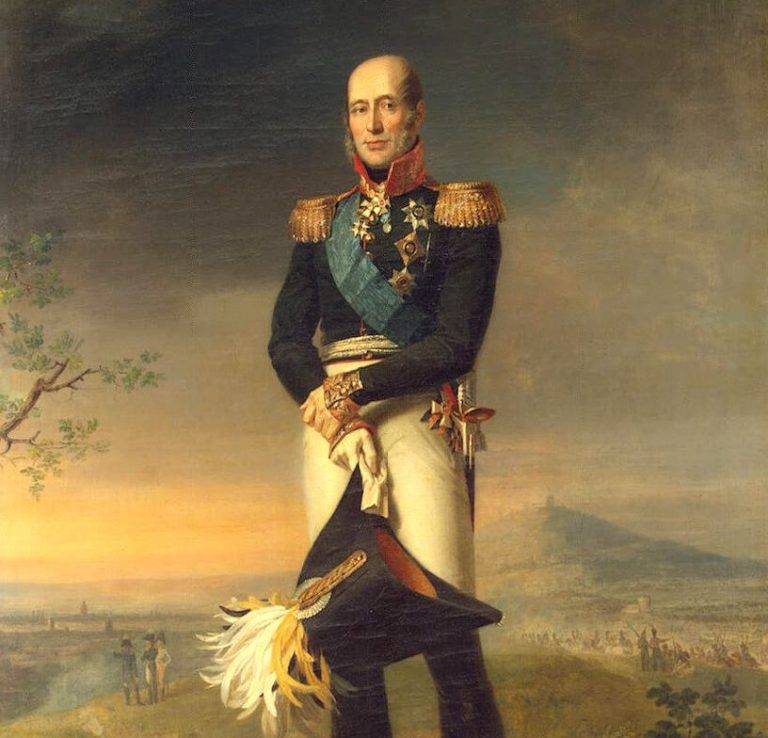
M.B.Barklay de Tolly led the actions of all the Russian armies only because he was a Minister of War, and he was never appointed commander in chief of the entire army. But we must remember that after the resignation of Barclay de Tolly, which happened, in fact, de facto, Emperor Alexander I had a very limited choice of candidates for commanders.
With accession, he could well count not only on the best generals who advanced under Paul I, but also on many of the “Catherine’s eagles,” one of which Kutuzov was rightly considered to be. But it seemed that Austerlitz had forever divorced him from Kutuzov, and during the first ten years of his reign, almost none of the “eagles” were left in the ranks.
By 1812, there were no field marshals in the Russian army. At the beginning of Alexander’s reign, one by one the old, but reputable field marshals Repnin, Musin-Pushkin, Prozorovsky, Elmt died, who received their wands under Catherine the Great and Pavel Petrovich. In 1809, the eternal rival of the great Suvorov, field marshal Count Mikhail Kamensky, who was very popular among the troops, also died.
Only two survived. 75-year-old N.I. Saltykov, educator of the Grand Dukes Alexander and Konstantin Pavlovich, was no longer fit for anything other than quietly chairing the State Council and the Committee of Ministers. A slightly younger 70-year-old I.V. Gudovich, despite being a member of the State Council and commander in chief in Moscow, completely lost his mind.
For example, he forbade him to come to the reception with glasses and condoned the embezzlement of his younger brother, which was the reason that the noble assembly voted for the candidacy of Gudovich in the election of the commander of the Moscow militia. Incidentally, MI won in those elections. Kutuzov, but he was also elected in St. Petersburg, and unanimously, and he preferred to settle there.
Who will order us to retreat now?
In fact, the first person who could then be represented as commander in chief was rightfully read the brother of the sovereign Konstantin Pavlovich. He did not have time to earn great authority in the troops, no one considered him a master of military art, but in the army he was loved and respected. Any of his orders would be carried out without reservation.
With a good chief of staff, such as Barclay himself, the prince was obviously capable of much. Under Emperor Paul I, a second son was raised with his older brother, preparing for accession to the Greek throne. He underwent military training in Gatchina, like his father, he adored the system and the “shagistika,” and, unlike his older brother, he had rich military experience. Already in 20 years he was a volunteer of the Suvorov army in the Italian and Swiss campaigns.
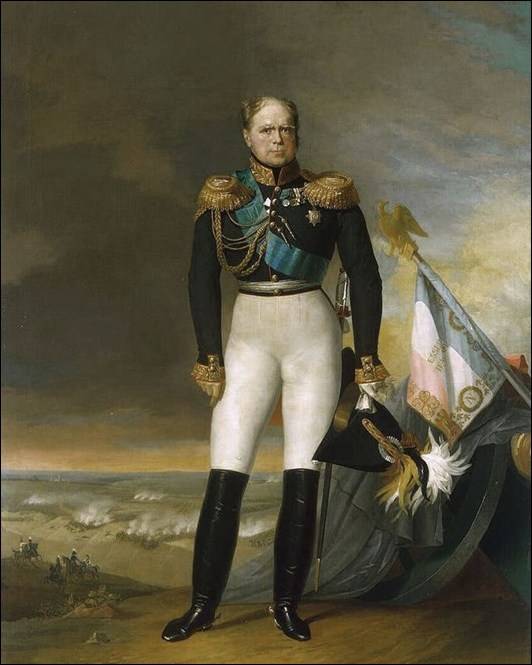
The great commander honored the royal offspring with the most flattering reviews and cruel scam for fervor, moreover, in the presence of experienced military generals. Tsesarevich Konstantin fought brilliantly against the French at Austerlitz and in the Polish campaign 1806-1807.
By 1812, he was only 33 years old, he already commanded the guard, and he did not have such problems as "seniority" in service. His appointment as commander in chief would not surprise anyone, although there are doubts that it would bring decisive success. But Alexander not only did not offer Konstantin to the post of commander in chief, but he soon recalled him from the army, leaving the 5th Guards Corps unnoticed by General Lavrov.
However, there are doubts that the reigning brother of Constantine was sincere when, without giving him any appointment in the army, he hastened to express fears for the fate of the heir to the throne. Alexander had two more young brothers - Nikolai and Mikhail, and claiming that Konstantin was not suitable for the role of commander in chief, the sovereign for some reason did not think about whether his brother was suitable for the roles of heir and emperor.
Few historians will recall, in this regard, the December of 1825, but, from the memoirs of contemporaries, the conclusion literally suggests that Alexander was always jealous of his brother's popularity among the officers. The emperor, who himself ascended to the throne as a result of the coup, simply could not but have concerns about this, because the victorious army, in which case, could well have elevated its leader to the throne.
Kutuzov could have another young and talented competitor - 34-year-old Nikolai Kamensky, who fought almost side by side with him in Turkey. He, like Grand Duke Konstantin, was very young in the Swiss campaign with Suvorov, fought at Austerlitz under the leadership of Bagration, defeated the Turks more than once, but died suddenly in 1811.
In the same 1811 year, the authoritative General Buxgeven also died, having repeatedly opposed the French and defeated the Swedes. As a result, in addition to Kutuzov, there were only five other real applicants for leading the Russian army in 1812, and it was their candidacy that was to be considered by the Extraordinary Committee, which was convened by order of Alexander I in early August.
It is characteristic that Alexander, understanding the very special character of the outbreak of the war, which was by no means accidentally called the Patriotic War, did not even propose to the committee for consideration the candidatures of the princes of Württemberg, Oldenburg and Holstein. And this despite the fact that he conducted intensive correspondence about a possible appointment with the disgraced French general Moro, who was in America, and the English general Wellesley, by then not the duke, but only Viscount Wellington.
Bucharest - Peas - Petersburg
So, Barclay formally, no one even dismissed. Leaving the army, Alexander I left him the commander in chief of the 1th Western Army, and at the same time left his Imperial main apartment next to him, where there were the Grand Duke Konstantin, and all the “German” princes, and Prince Volkonsky, along with Count Armfeld and the omnipresent General Bennigsen . All of them intrigued against the “half-commander” and regularly complained to him to the emperor.
Meanwhile, the events with the appointment of Kutuzov developed very quickly. Himself 67-year-old commander, by the way, did for this, almost everything he could. To begin with, even before the war with Napoleon, he, who commanded the Moldavian army at that time, not only defeated the Turks at Ruschuk, but also managed to conclude an extremely necessary peace with them. And he did this literally a few days before Admiral Chichagov came to replace him in Bucharest with two rescripts signed by the emperor.
In the first, on April 5, Kutuzova was waiting for the resignation and recall to Petersburg to “sit in the State Council” there, in another, awards and honors, already signed on the 9. Kutuzov, who had won the long-awaited peace, received a second from Chichagov, and in order to ratify the agreement signed by him with the Turkish commander Galib Effendi, he went on to deft misinformation.
He presented the Turks with a visit to Vilna by the Adjutant General Napoleon Count Narbonne as a friendship mission, as if the French were ready together with Russia to go on the immediate partition of Turkey. The sultan almost immediately allowed Galibu-effendi to sign the Bucharest peace, and Kutuzov calmly went to his estate Peas in Volhynia. There he received the news of the beginning of the war with Napoleon.
26 June General Kutuzov arrives in the northern capital, awaiting appointment. It is well known that Alexander I did not like Kutuzov, and not from Austerlitz; this general did not like the young emperor as the military governor of St. Petersburg. Kutuzov was not afraid to put the metropolitan police department in its place, allowing almost Jacobin liberties in the city, for which he was immediately sent for a couple of years to an honorary link.
However, Alexander could not do without Kutuzov in the 1805 campaign of the year - his only real competitor, the old field marshal Kamensky, in those days, finished off the Turks in Wallachia. Kutuzov masterfully retreated to Vienna, leading the Russian troops along with the remnants of the Austrians defeated by Napoleon near Ulm from the blow of the superior French forces.
The Russians inflicted several painful attacks on the French in rear-guard battles, and the Mortier corps was generally defeated near Durenstein. The commander-in-chief boldly exposed the entire French army near Schöngraben to the rearguard of Bagration (he, according to Leo Tolstoy, “was truly saved by a miracle”), which saved the army from encirclement.
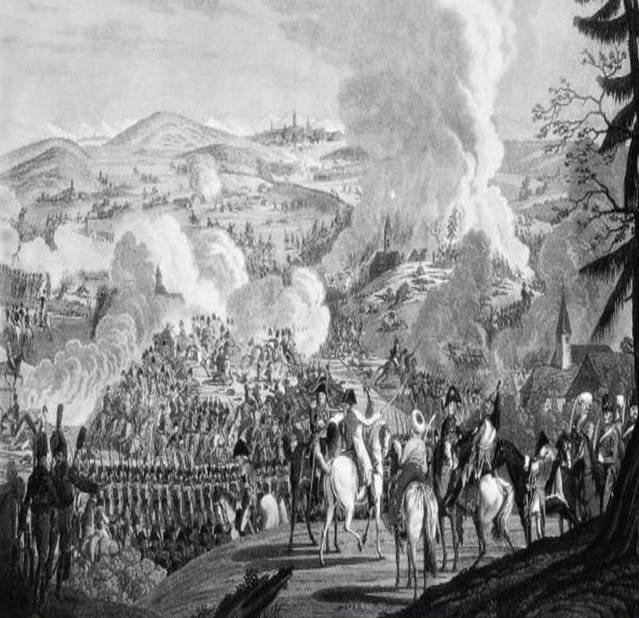
Kutuzov was ready to retreat further, but Napoleon was able to convince the supreme leaders of the allies - the two emperors Alexander and Franz of his own weakness and actually provoked them to battle. The result is known - the defeat of the Russian-Austrian army near Austerlitz was complete, but Kutuzov’s military authority, strangely enough, remained unshakable. However, he was removed "from the eyes of the sovereign out of sight", having directed to deal with the Turks.
Already in St. Petersburg, Kutuzov first receives a somewhat strange appointment as commander of the 8-thousandth Narva Corps. This was followed by the election of the commander of the St. Petersburg militia, which forced Kutuzov to abandon the same honor in Moscow. And for peace with Turkey, he was granted the title of Most High Prince and entrusted with the command of all naval and land forces in the capital.
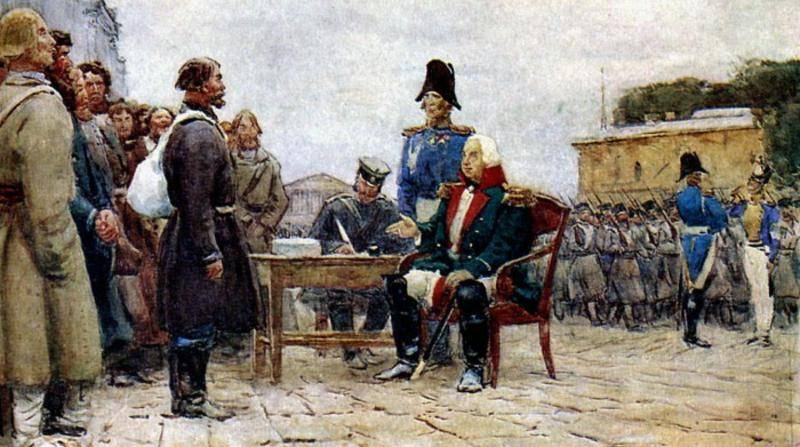
But all this in reality is nothing more than regalia. 30 of thousands of militias gathered in a matter of days, the princely title is, of course, wonderful, but very small and not the main advantage when choosing the commander in chief. The fact that such an appointment is about to take place, says the whole of Petersburg.
All this time, Kutuzov, not at all embarrassed, launched his old connections, right up to prominent positions in the Masonic lodge of St. Petersburg and his acquaintance with the tsar’s favorite Maria Naryshkina. A true courtier, by no means without ambition, he understood that the campaign that had opened could become his "high point". Kutuzov no worse than others understood that he did not have many serious rivals for appointment to the highest post.
The committee makes a decision
It seems that members of the Extraordinary Committee, which Alexander decided to collect shortly after arriving from Moscow, understood this quite well. All the most important thing happened in one day - August 5. In the morning the emperor got acquainted with letters in which Count Shuvalov convinced the tsar of the need to appoint a single commander in chief, and Barclay reported on the retreat of the joined armies to Porech. And this is after he was ordered to advance.
Arakcheev was entrusted with assembling the Extraordinary Committee of the most important dignitaries of the empire, and representing the person of the sovereign in it. The chairman of the State Council included the already mentioned elderly Field Marshal Count N.I. Saltykov, Count V.P. Kochubey, St. Petersburg Governor General S.K. Vyazmitinov, Minister of Police A.D. Balashov and member of the State Council Prince P.V. Lopukhin, by the way, is the head of the Masonic lodge “The Great East”.
According to Arakcheev’s report, for some three hours - from seven to ten in the afternoon, a decision was made in favor of Kutuzov. The committee immediately remembered that Mikhail Illarionovich, despite his considerable age, was not only very popular, but also a very active commander. Many of his comrades-in-arms, like Bagration or Ermolov, considered him not very successful, but they obeyed him implicitly. The authority among the officers and generals of Kutuzov was, let's say, quite sufficient.
Prior to Kutuzov, committee members considered the candidatures of generals L.L. Bennigsen, D.S. Dokhturova, P.I. Bagration, A.P. Tormasova and P.A. Palena. And if Friedland was not forgotten by Bennigsen, then Palen was rejected due to his almost complete lack of combat experience. Dokhturov and Tormasov did not arrange a committee, since they were few known and almost never were independent commanders, and Bagration’s candidacy did not literally pass from the words of Alexander I, who wrote to his sister that he “understands nothing in strategy.”
Isn’t it, somehow surprisingly easy and simple Kutuzov was appointed to the post of commander in chief? Remember how in Tolstoy’s novel the visitors of Anna Pavlovna Scherer’s salon were shocked by this? But, apparently, the members of the Extraordinary Committee had, for all that, serious reasons for such a decision. And it is worth remembering how quickly in the same salon Scherer Kutuzov decided to recognize "his".
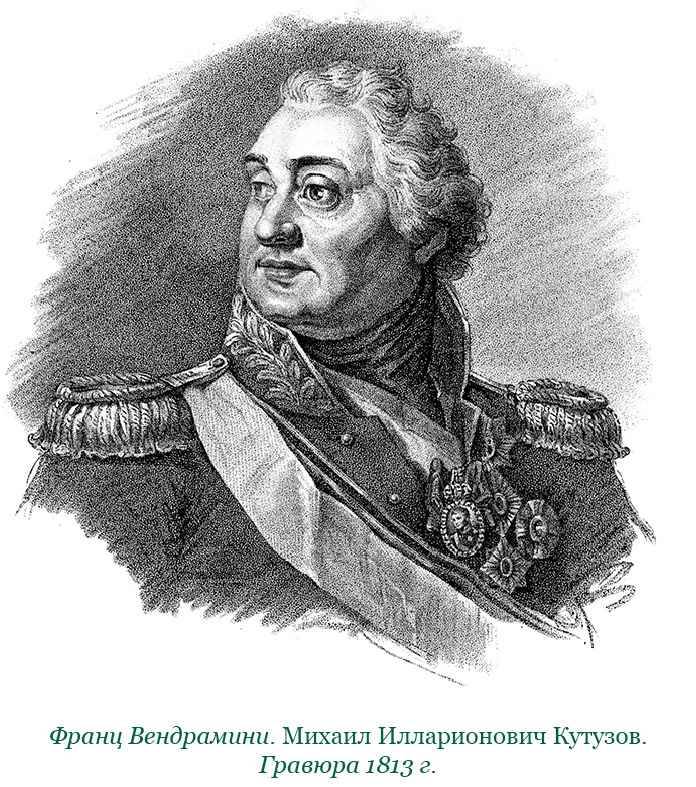
Despite his immoderate addiction to alcohol and women, in the company of the old commander with good reason was considered courteous, sophisticated and cunning. In the army, under the leadership of Kutuzov, all the officers and the vast majority of generals were ready, the soldiers treated him like a good master. Such, if necessary, he will ask them, if necessary, and will be executed, but they will always be dressed, shod and full, and even if they “work well”, the “master” will not skimp on the awards.
In the end, one cannot help but recall that for some reason today, not only idle conversations, but also Leo Tolstoy’s deep-rooted attitude towards Kutuzov as an “old satyr” is in fashion again. However, in the 1812 campaign of the year, he, with all the visible manifestations of laziness and simply causing sybarism, proved himself to be an exceptionally enterprising commander.
After all, not only his troops were always active, giving the French a respite only for the time that they held Moscow. The 67-year-old commander himself, contrary to the assertions of a number of contemporaries, often spent several hours in the saddle, circling the positions. Meetings on the map almost constantly dragged on at Kutuzov well after midnight.
On the Borodino field, the Commander-in-Chief did not sit out at all in the headquarters in Gorki, but constantly traveled around his positions, although mostly not on a horse, but in a cart. And all this - according to the testimony of those same critics who, in fact, did not skimp on caustic remarks about their commander in chief. One cannot but recall that on the night before the battle Kutuzov participated in a long prayer service in front of the icon of the Mother of God of Smolensk.
We are not the first to say that story He does not know the subjunctive mood, but the choice of the commander-in-chief in World War II could not be accidental, and it was not at all accidental that Mikhail Illarionovich Kutuzov was given the glory of the “French winner”. For a long time in the Russian Empire and in the Soviet Union, among historians Kutuzov, as a military leader, without any reservations it was customary to consider at least equal to Napoleon.
Meanwhile, Russian regiments came to the walls of Paris under the leadership of other commanders, and the old Field Marshal Kutuzov died in the Silesian town of Bunzlau shortly after the French left Russia. Nominally, the Austrian field marshal Schwarzenberg was considered the commander in chief, the Russian forces were again led by Barclay de Tolly, but Emperor Alexander I himself became the true supreme leader of the allied forces.
- Alexey Podymov
- Karl-Ludwig-Johann Habsburg. Archduke defeating Bonaparte
They defeated Bonaparte. William Sydney Smith
They defeated Napoleon. Part of 2. Heroes of Eylau
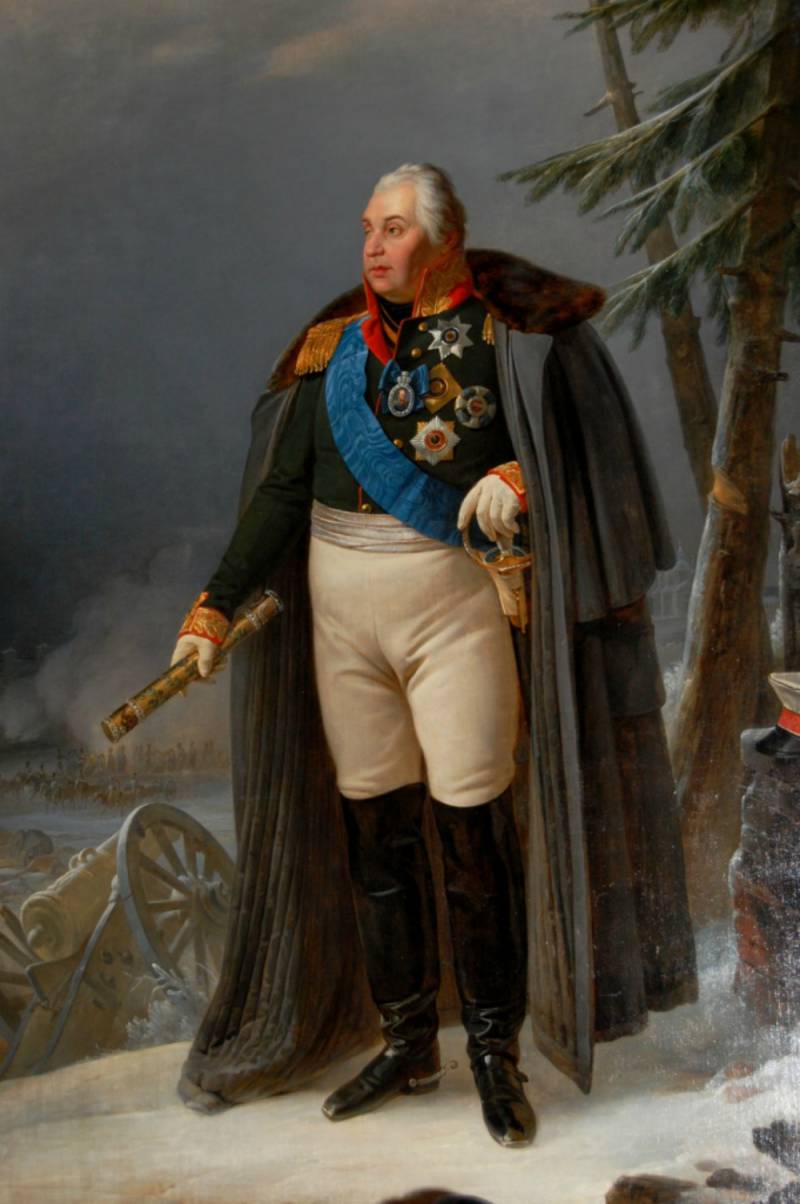
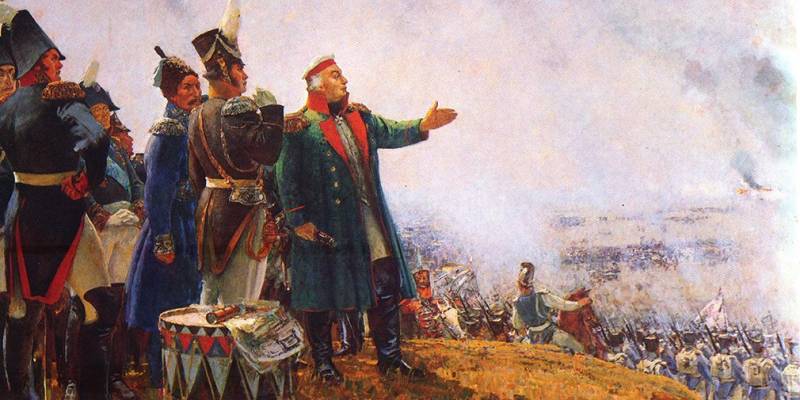
Information